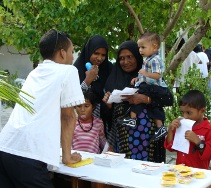Maldives: Empowering communities to address drug use
First ever community health camp held at the Fenfushi Island
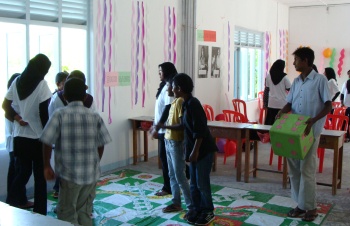
Fun and laughter filled the air at the first ever health camp held in the Fenfushi Island of the Alif Dhaal Atoll in the Maldives. The camp was organized on 27th November this year by the NGOs SWAD (Society for Women Against Drugs), Journey and Fenfushi Zuvaanunge Dhirun, in collaboration with UNODC, under the project "Strengthening the National Response to Combat Drug Abuse in the Maldives". Supported by the EU, one of the objectives of this project is strengthening and supporting community-based approaches for drug use prevention, treatment and care for drug users and their families.
The project is especially relevant in the Maldives, which is witnessing the growing use of drugs, particularly amongst the youth. As injecting drug use becomes more common, there is a great risk of HIV, hepatitis C and other blood-borne diseases becoming more prevalent in the community. The project is being implemented in partnership with Narcotics Control Council (NCC), Department of Drug Prevention and Rehabilitation Services (DDPRS) and the Ministry of Health and Family, Government of Maldives.
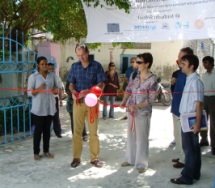
Taking the lead role in organizing the event, the NGOs SWAD and Journey conducted prior meetings with various stakeholders to enlist their support. They also trained 30 local youth volunteers and staff from Fenfushi Zuvaanunge Dhirun, a local youth NGO, to assist in organizing the various activities on the camp. A series of advocacy meetings were held with the community to disseminate information about the objective and scope of the camp. These meetings helped the NGOs to closely work with the community and jointly work out the logistics and a campaign to reach out to as many people as possible on the island.
These ground building exercises generated keen interest about the camp and also health related issues in the
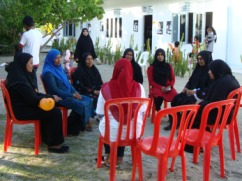
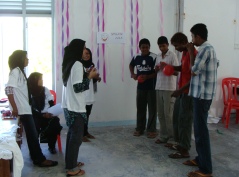
The health camp was conducted in line with UNODC's approach of Low Cost Community-based Care and Support for drug users (LCCS). LCCS is a proven advocacy instrument which involves local organisations and community members to reach out and provide services to drug users in the community. It draws on trained human resources and other locally available resources, to scale-up quality services for drug users, including those related to prevention of HIV. The LCCS approach is particularly useful when drug users are located in remote settings, far away from any institution-based drug treatment. It is also beneficial for those who cannot spare time to access regular services or afford the cost of such services.
As demonstrated by the health camp, this LCCS approach can also be effective in the Maldives, where services for drug users and their families are limited and available only in certain parts of the country. In order to respond effectively, it is vital to expand the availability of drug related services and make them accessible at the atoll and island level. UNODC envisages close collaboration with the Maldivian Government and the civil society to address the adverse consequences of drug use in the country, by reaching out to those who are at high risk and are hard to reach with a human rights approach to drug abuse prevention, treatment and rehabilitation services.
UNODC's work on drug use and HIV prevention in the Maldives is possible thanks to the contribution of the European Union.
Click here to view the photo gallery of the health camp
